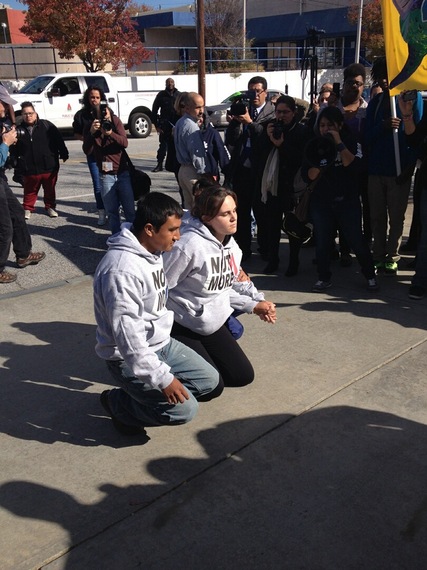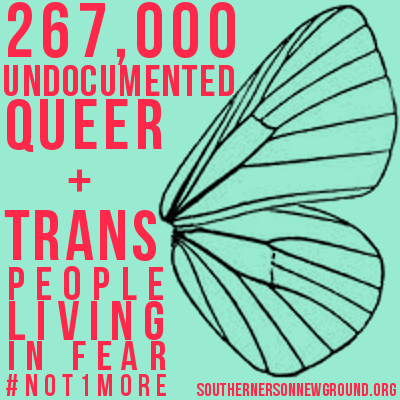What makes a white, 32-year-old, middle-class queer woman with no prior charges decide to risk arrest on a November day in Atlanta in order to stop ICE from deporting immigrants? I could tell you a story about the profound bravery of undocumented people besting fear every day just by living their lives in the open. I could also tell you about my own family and the impact of ICE and deportations on our lives. Or I could explain to you why deportation is not about national security or protecting jobs but about controlling people at the margins, forcing them into fear and cages, and then using them at will. But other people have said those things better than I.
Instead, I want to talk about fear. I have lived my life as a survivor of sexual violence and as a queer person in the South. I know something about fear. Queer people, women, people of color, immigrants, poor people -- we learn to be afraid. From the lonely drive to work in the morning to using public bathrooms, walking alone at night to the intake of breath as we pass a police car on the street, we are trained to live in fear, taught that someone violent is watching us. We ask ourselves whether our bodies are too female, too queer, too brown, too black. Do I look tough enough? Am I hidden thoroughly enough? Yet for me personally, in every gash or paper cut of violence in my life, I have also felt the seed of my will. My will tells me that we are longing to be seen. Longing to be known.
Many are enduring far more violence than I, and therefore longing even more to be seen and known, I would imagine. This as they make up hotel beds for other people, pretend to be straight, and are told who they are by talking heads on TV, and where they can walk or drive by systems like ICE. This as they dress in "American drag," pretending that they are U.S. residents alone and do not hold universes of other places and times carried inside them, of legacies that have come from other continents. We are longing to feel what our lives are like beyond gnawing fear and daily grind. When we come out, when we demand to be seen, we claim our lives as our own, and that claiming, that spiritual oxygen, carries us past our fear and into what is possible.
For 32 years I have been rewarded for looking straight, acting straight, being white, being middle-class: money in my pocket, nights at hotels for my nonprofit job, and plenty of time to fine-tune all my big ideas. Because that is my daily life, I am scared today. But I am scared of more than one thing. I am not only scared of cold or risks or handcuffs. I'm also scared of the numbness that comes when we say we believe something but do not act on it. I am scared of the complacency that sometimes comes over me, that comes over so many of us, lulling us to a gentle, apologetic sleep, and how this sleep slowly siphons away our desire to resist, our muscle for struggle.
Resisting what is slowly or quickly destroying us is a practice. We have to stay muscular and strong. We stir up our spirits and build ourselves up for this not only through good talks and good books and good comrades but through taking shared risks for our visions of liberation. These visions are not just about giving a few of us a few more rights; they are about ending the daily assaults on our bodies and spirits. We do not only dream our queer bodies (and all bodies) being free. "Intersectionality" is not a buzzword. It's a practice that, through repetition, forms a life. It calls us to act in broad and bold ways not only for the wholeness of others but for ourselves. We feel the ache in the back of our teeth when we hear that call and do not answer it. Every time we use our checkbooks, our bodies, and our time for this call, we are changed, bit by bit. Every time we drag our integrity, our ability to fully be who we say we are, back from power systems, we are liberating a small corner of ourselves. For one moment we are not accomplices in our own oppression, and we can feel it.
No one needs to wait to be invited to that kind of individual and collective struggle. Our chance is always there. There is nothing particularly special about me in my jeans and sweatshirt, hair graying rapidly. There is just some dyke in downtown Atlanta taking her chance -- her chance to be part of that.
#not1more

